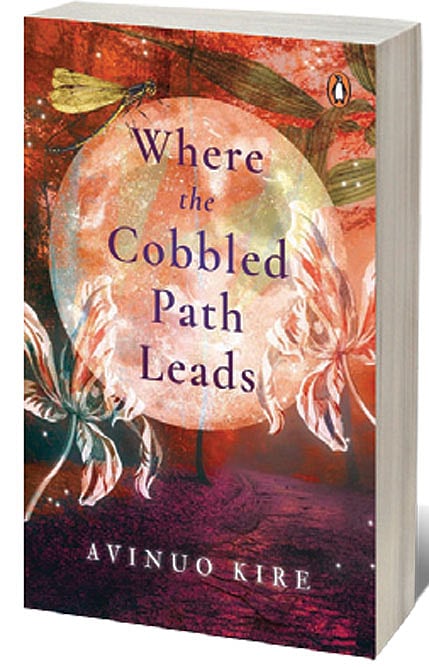A Way from Death to Life

HEROINES COME IN different shapes and sizes. Some stand up to tyrants; some slay dragons. Some save worlds, and some change lives. Others have to haul themselves up by their bootstraps and forge a way forward through grief and pain.
Vime, the heroine of Avinuo Kire’s Where the Cobbled Path Leads, is one of the latter. A pre-pubescent schoolgirl, Vime is battling the misery of her mother’s death a year earlier. Vime’s elder sister Neime and their father seem to be settling in better. Neime is busy keeping house and starting college; their father is looking to remarry—but Vime, lonely, missing Mother, finds it increasingly difficult to adapt to a life without her.
Vime finds some solace in going down a secret path she knows: “… a crumbling cobbled mossed walkway, level ground playfully interlacing with stairs, minuscule wild daisies and cudweed on the grooves and edges, winding in, out, trailing further and further down into the deep woods.” The cobbled path has been, for long, Vime’s happy place, and it becomes even more so after Mother’s death. Until, on the day of her mother’s first death anniversary, Vime meets someone strange and fascinating when she goes down the cobbled path.
What follows is an engrossing adventure, as Vime—in between trying to cope with mundane real life—catches a glimpse of an alternate world where perhaps her dearest wish may be granted. On the one hand, she must get used to living with Khrielie, her stepmother, who is very young herself. On the other, she must find a way out of the trap into which she’s unwittingly fallen, as a result of her forays into a world that abuts her own.
AIming High
20 Feb 2026 - Vol 04 | Issue 59
India joins the Artificial Intelligence revolution with gusto
Where the Cobbled Path Leads is an interesting book, and one that is not easy to slot. On a superficial level, it appears as a somewhat sophisticated children’s fantasy, an adventure that starts off on a high but goes out of control and becomes a race for one’s life. On a superficial level only, because there is more profundity here, deeper and more nuanced elements to the story. There is a bringing together of Naga folklore on the one hand, and modern life on the other. There is death, and there is life. There is the everyday routine of school and home, and there is the backdrop of socio-political tension as the insurgents of the Naga army play a game of cat-and-mouse with the Indian government.
Through it all, there is a sense of equilibrium. A balance between quiet introspection and high-adrenaline adventure; between solitude and company. Myth and reality. Old and new, both in religion as well as other ways of life. Most importantly, between life and death. Death—of a much-loved parent, in Vime’s case—is seen here primarily through the prism of what it does to a bereaved offspring, but there are other insights into death scattered through the story. For instance, there is the grief of a young widow: a sorrow so deep that it imprisons the dead husband in a state of limbo. But the grief is balanced; even though intense, it is presented in a way that isn’t melodramatic—and eventually, through the realisation that comes to Vime as a result of her adventures, there is a path forward, a way from death to life.
Kire paints a poignant picture of loss and bereavement, but also, eventually, one of hope and new beginnings. How Vime and Khrielie find a way to escape the doom that threatens them is a heart-warming metaphor for what life may offer as a solution for those of us who grieve. If there is a jarring note, it is the one regarding Khrielie herself. A girl married off to a man who is perhaps old enough to be her father, is nothing new, either in fiction or in reality; but Kire leaves this unquestioned, Khrielie’s fate is sadly decided for her.

